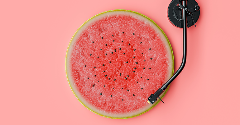News
Cocoa fruit juice: The next big beverage ingredient?
9 Nov 2020Cocoa fruit juice has a refreshingly sweet and sour flavour with tropical notes of lychee and peach, making it ideal for premium-positioned drinks, says Ghanaian-Swiss supplier Koa.
The beans that are used to make chocolate account for just one-quarter of the entire cocoa pod, and the juicy white pulp surrounding the beans (which also makes up 25% of the fruit) currently go to waste.

Koa is a Ghanaian-Swiss company aiming add value to this pulp by bringing sustainably sourced cocoa fruit juice to the world.
The under-utilised ingredient does not taste like chocolate, but rather has tropical flavour notes of banana, white peach and lychee and a balanced sweet-sour profile, it says.
Koa gently removes the while pulp, leaving the beans intact so they can be fermented and used for chocolate, and then presses the pulp to extract the juice. It also developed a rapid proprietary production process – it pasteurises the juice within three hours – which means the flavour of the just-pressed juice is preserved without the need for additives.
The juice, which has a shelf-life of nine months when stored at 6°C, is a natural source of polyphenols, magnesium, and potassium and has a cloudy, yellow appearance. It is available in two formats: cocoa fruit juice, Koa Pure, and concentrated cocoa fruit juice, Koa Concentrate, both of which are free from additives.
Two premium beverage companies recently launched products using Koa’s cocoa fruit juice: German brand Majus and Dutch company Kumasi, whose range includes a 100% juice and a soft drink, made with carbonated water and cocoa fruit juice.
Niche but growing
Although still a niche ingredient, interest in cocoa fruit juice is growing and several larger companies, including Barry Callebaut, are already looking into it, said Andrea Werdin, marketing director at Koa.
“This is a proof that there is a demand in the market. And for us, it brought more awareness,” she told The Ingredients Network. “Healthy competition is inspiring.”
The supplier believes cocoa fruit juice could become a popular drink worldwide, with strongest potential demand coming from Europe and the American continent, as well as Koa’s home region of West Africa.
“Cocoa fruit juice’s wide application range and the versatile flavour profile enables [it] to be integrated in many food cultures,” Werdin said, adding that she sees potential beyond beverages to include products such as ice cream, chocolate, bakery, pastry, gummy sweets and natural sweeteners.
Solar-powered and sustainable
Founded in 2017 by Michael Acquah from Ghana, and Benjamin Kuschnik and Anian Schreiber from Germany, Koa has offices in Assin Akrofuom, Ghana and Zurich, Switzerland. So far, it has produced 75,700 litres of cocoa fruit juice but it is currently scaling up production and planning a second factory to expand capacity.
The manufacturing process takes place almost fully in Ghana, apart from Koa concentrate which has a final processing step in Switzerland.
The lack of infrastructure and climatic conditions in cocoa-growing regions of Ghana initially created manufacturing challenges and required Koa to come up with its own solutions.
Working with experts from Swiss and Ghanaian universities, it developed a solar-powered community mobile processing unit (CMPU) to extract juice from the cocoa pods. This means it can move from community to community, processing the pods next to the farms, ensuring an efficient production flow.
“This enables us to work with many farmers at the same time. As of today, 1,233 farmers have entered a cooperation with us,” said Werdin. “Through renewable energy, we can process cocoa fruits even in remote areas. Solar power also enables us to immediately cool the fresh juice to guarantee best quality. The cooling chain is quite unique and is established from the CMPU all the way to the warehouse in Europe.
“After processing at the CMPU, the beans are returned to the farmers so they can proceed with the traditional fermentation of the beans. At the same time, our team brings the juice to our factory in Assin Akrofuom [where] we gently pasteurise the juice and package it.”
QR code offers on-pack traceability
Koa offers a track-and-trace service for supply chain traceability, and manufacturers can add a QR code to their products’ packaging that consumers scan to see how the juice is made and the impact it has on local Ghanaian communities.
“We go beyond sustainability and take responsibility for every single step in our value chain,” Werdin said. “Transparency has become our top priority and all our products are traceable to its origin. Everyone can directly see how much additional income has been generated for the farmers in each community.
“For end-consumers, it is a win-win situation: they are happy to have an innovative, healthy product while being aware that they have done something good, i.e. the cocoa farmer earned 30% extra and food waste was reduced by 40%. We are convinced this is the future of food production.”
Related news

Retail landscape lacks nutritious and affordable food, says ATNi
30 Dec 2025
A rapid increase in modern food retail has given retailers growing influence over consumer diets, according to global non-profit ATNi’s latest assessment.
Read more
Debate over ban on ‘meaty’ names for plant-based products reaches stalemate
26 Dec 2025
The debate over a ban on plant-based products using “meaty” terms has reached a stalemate, leaving manufacturers in limbo and still facing overhauls to their marketing and packaging.
Read more
Multi-sensory food and drink products to gain traction in 2026
16 Dec 2025
Trend forecasters predict that sensory elements will play a larger role, helping food and beverage brands differentiate themselves in a competitive market in 2026.
Read more
Big appetite for M&A between European and US food and drink companies
3 Dec 2025
Persistent tariffs on EU food and beverage exports have helped drive record levels of M&A activity between European and US companies this year, according to analysis by ING.
Read more
Non-UPF Program extends certification scheme to entire food industry
30 Nov 2025
The Non-UPF Program has extended its certification scheme to the wider food sector, championing a move towards healthier consumption habits.
Read more
Lancet study links UPFs to chronic disease risk
26 Nov 2025
UPFs are consistently associated with an increased risk of diet-related chronic diseases, according to a comprehensive review of global evidence in The Lancet .
Read more
Concerns swirl around cinnamon’s compliance with EU law
25 Nov 2025
Cinnamon may be a top functional ingredient, but it needs stronger protocols to ensure it meets EU food safety laws and quality standards, say researchers.
Read more
Oat Barista: Innovation for game-changing beverages
20 Nov 2025
Oat Barista is a clean label, sustainable, and innovative drink base specifically designed to create the perfect foam in one single ingredient.
Read more
How younger consumers are redefining ingredient choices and rejecting brand loyalty
18 Nov 2025
Gen Z and millennial consumers’ preferences for transparency, functionality, and purpose are “redefining the very nature of consumption itself”, says SPINS.
Read more
Hybrid formats and flexible positioning to disrupt category norms in 2026
17 Nov 2025
Trend forecasters expect food and drink to move more fluidly across occasions, functions, and formats as consumers seek versatility, novelty, and convenience.
Read more